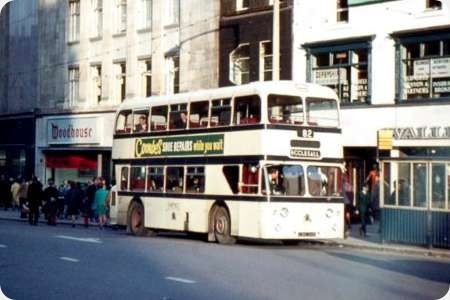
Sheffield Corporation
1964
Leyland Atlantean PDR1/2
Neepsend H44/33F
Nice body – pity about the chassis! Neepsend produced a striking looking body (ok, I know – it was an East Lancs design) for the 20 buses delivered in 1964/5 plus a further 20 in 1966. I rather preferred this first batch with the red upholstery and red wheel centres. They also combined sliding windows and rotovents in the top deck. They were regular performers on the cross city 82 service. 348 of this batch had ducted air saloon heating as a trial, later to become almost universal, as opposed to the underseat heaters of the remainder of the batch. The bus is in Fargate, Sheffield, nowadays pedestrianised but many of the buildings are still there.
Photograph and Copy contributed by Ian Wild
02/03/15 – 07:32
Did Sheffield Corporation specify the PDR1/2 chassis in order to provide more headroom on both decks, in the same manner as the Nottingham Renowns? It’s difficult to tell from the photograph but this vehicle doesn’t look to be low height.
Chris Barker
04/03/15 – 15:45
These were 14ft 3in if memory serves me right. They were designed to fit under a low bridge at Darfield on the 70 to Upton. There were special instructions in the Drivers Handbook about both batches.
Neil Hudson
04/03/15 – 15:45
Manchester Corporation had 132 of the PDR1/2 model. At the time it was thought that this was for reasons of standardisation, in that the gearbox was the same as on the many Fleetlines in the fleet. These vehicles had Metro-Cammell “Orion” bodies to an intermediate height of 14 feet and half an inch. They sounded very different from PDR1/1 Atlanteans, the gearbox whine being very prominent.
Don McKeown
05/03/15 – 07:11
It seems a bit unlikely that Sheffield would have bought 40 A fleet buses to a special reduced height for a B service requiring perhaps two buses. I suspect that it was coincidental that they happened to fit under the bridge on route 70 but maybe a Sheffield expert can confirm this.
Ian Wild
06/03/15 – 06:41
During my time in Sheffield in the 1960s and 70s, there were three routes which required low-height double deckers – service 70 to Upton (a C route) and B routes 6 and 19 to Dinnington. The C fleet had no suitable double deckers but only one bus was needed on service 70 (joint operator Yorkshire Traction normally used saloons). All three routes were served by the B fleet’s lowbridge Regents and later by Bridgemasters from the A fleet, in which fleet there was no requirement for low-height deckers! A lot of mileage balancing must have gone on. I’ve no recollection of the Neepsend Atlanteans being so used and I’m fairly sure a saloon was used on 70 by the time I left the area in 1975.
Geoff Kerr
07/03/15 – 07:14
My understanding of the Manchester PDR1/2 situation is that there was a low(ish) bridge on a service to Partington (222/223) which was run jointly with North Western. When this service first started, MCTD didn’t have any buses to put on it. They didn’t like the idea of being a ghost operator, but neither did they like the idea of buying special buses for one route. So they changed their standard spec for both Atlantean and Fleetline bodies to the intermediate height, which required the use of the PDR1/2 chassis for the Atlanteans. All subsequent double deckers were built to this height until the Mancunians appeared.
Peter Williamson
07/03/15 – 17:14
Peter, am I right in thinking that this arrangement meant the Atlanteans and Fleetlines shared a common drive train.
Phil Blinkhorn
08/03/15 – 06:54
Phil, the PDR1/2 used the Daimler concentric drive gearbox of the Fleetline in conjunction with the dropped centre axle from the Lowlander. Daimler used its own dropped centre rear axle.
Roger Cox
08/03/15 – 16:12
Thanks Roger
Phil Blinkhorn
25/03/15 – 16:24
I think they also operated from Bridge St. on the Shiregreen route, 47 or 48? They were always parked by Firth Park shops.
Andy Fisher
Leave a Reply